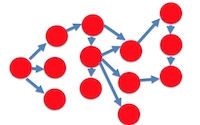
How Authors and Readers of ePortfolios Make Collaborative Meaning
This article reports on a case study, using a think-aloud approach (Boren & Ramey, 2000; Jaspers, Steen, van den Bos & Geenen, 2004; Kilsdonk et al., 2016), to investigate how different types of audiences interpret ePortfolios. During recorded viewing, students, instructors, and business professionals narrated their experience of reading two ePortfolios. Consistent with findings by […]
















